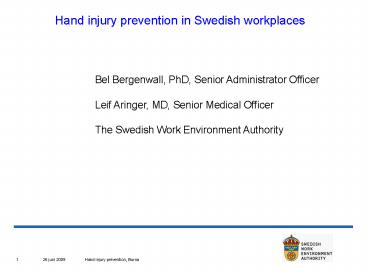Hand injury prevention in Swedish workplaces - PowerPoint PPT Presentation
1 / 9
Title:
Hand injury prevention in Swedish workplaces
Description:
A tool I (knife: restaurants and abattoirs) An animal. Vulnerable occupations (hand injuries): Food industry (abattoir workers, butchers, ... – PowerPoint PPT presentation
Number of Views:66
Avg rating:3.0/5.0
Title: Hand injury prevention in Swedish workplaces
1
Hand injury prevention in Swedish workplaces
Bel Bergenwall, PhD, Senior Administrator
Officer Leif Aringer, MD, Senior Medical
Officer The Swedish Work Environment Authority
2
Hand injury prevention in Swedish workplaces
Comparison of the incidence rate of accidents
with three days absence for the nine main
business branches (agriculture, manufacturing,
energy and water, construction, trade and repair,
hotel and restaurants, transports, finance and
business), (RUROSTAT).
3
Hand injuries prevention in Swedish wokplaces
- Main causes to body injuries.
- Slippery floors and stairs
- Loss of control of
- of a machinery (grinders, drills, chain saws,
circle saws), - a vehicle, (industrial trucks),
- a tool (knives in restaurants and abattoirs), or
- an animal.
- Vulnerable occupations (hand injuries)
- food industry (abattoir workers, butchers, ...),
- wood industry (housing, carpenters, and others),
and - packaging, and pulp and paper industry.
4
Hand injury prevention in Swedish workplaces
- Body part injuries (last few years)
- Most accidents lead to body parts injuries.
- Four types of injuries stand out when looking at
the occurrence of occupational injuries. - i) hand and fingers,
- ii) hip, leg and foot, and
- iii) back.
- With i) and ii) being at risk more than twice as
often as other body - parts.
5
Hand injuries prevention in Swedish workplaces
Business activities where accidents leading to
hand injuries are predominant in Sweden for 2008.
The average accident rate is about 6 per 1000
workers for all occupations.
A large portion of body parts injuries are hand
injuries.
6
Hand injuries prevention in Swedish workplaces
- Factors behind low accident rate in Swedish work
places! - Socio-economic and cultural factors (macro level
factors) - Awareness among all parties of the benefits
(social and economic) of good and safe working
environment. - Waging practices
- Minor injuries do not necessarily result in
absence from work. - Workers have to pay for their first day of
absence due to sickness or an injury. - Labour market rules
- In layoffs workers with more experience remain at
work (the last in the first out principle).
More experienced workers remain in the company. - Full-time employment.
7
Hand injuries prevention in Swedish workplaces
- - Emplimentation of safety, work practices,
education (Meso and Micro factors) - Work ethics and practices (safe working methods,
importance of use of protective equipments,
etc., are thought at early age). - Teaching is based and includes health and safety
regulations. - Most Swedish workers were high school graduates
(3 years), and have a relatively long practical
experience before being fully considered as e.g.,
a qualified, construction worker, carpenter, etc. - Employees are involved to enforce and develop
tools and practices for work environment (by
law).
8
Hand injuries prevention in Swedish workplaces
- Accident investigations and in depth-studies
- Clear goal gt specific aspects gt structure gt
conclusions gt implementation of findings - Learn more about the accidents,
- Take immediate measures.
- These generally have better effect in bringing
about measures within the company and enhancing
work environment awarness. - Identify risk areas
- Take measures gt insure that meaures bring
expected results - Regulations, Intensify e.g., inspections
- Follow-up and evaluation
9
Hand injuries prevention in Swedish workplaces
- Good work environment is a result of a
combination - of short and long term actions and measures taken
by all parties - Thank you for your attention































